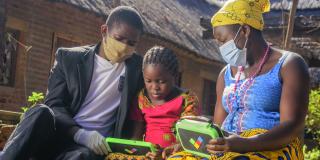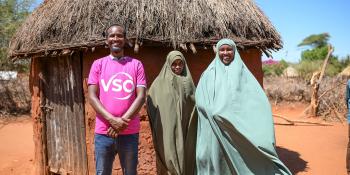
This article first appeared on Devex.
The COVID-19 pandemic has radically changed the way we work, and it’s likely to have a lasting legacy in terms of how we use technology to deliver development programs around the world.
They say that “necessity is the mother of invention,” and much has been made of the need for the development sector to make better use of technology and remote support. It would seem that now is the opportunity to make a leap forward.
Tech provides both a practical response to the reality of restrictions on travel, as well as a chance to accelerate some welcome trends in the sector — the increasing use of streamlined interventions such as cash transfers and the localisation of delivery staff, for example.
But as a sector, we shouldn’t become reliant on technological interventions that, by definition, cannot reach the most marginalised groups. Humanitarian and development work ultimately succeeds because of human relationships built between staff, volunteers, and local residents within communities. Technology doesn’t change that. It can streamline and it can support trust and two-way dialogue, but it doesn’t replace it.
With that principle in mind, there are a few important lessons that nongovernmental organisations should apply when using technology in their programming — both during the pandemic and beyond.
The first is access. Reaching the most marginalised has always been the most challenging but most important part of any NGO’s work. Online technology can offer neat, streamlined solutions to complex delivery problems — all the more so during the pandemic.
But its use must never increase the risk of certain groups missing out. The most recent data from the World Bank shows that half of the world’s population are not regular internet users, including on mobile phones. In many of the most fragile states in Africa, the figure is commonly in excess of 90%. Of the countries ranked lowest in the Human Development Index, the proportions of people without internet access are 92% in South Sudan, 96% in Central African Republic, and 95% in Niger.
When designing programs, we must be mindful of this reality and rigorous in holding ourselves and donors to account on reaching the most marginalised.
There can be no technological substitute for social capital built up over years within communities.
Secondly, by extension, we shouldn’t forget the value of low-tech solutions. Many NGOs are currently disseminating vital public health information via radio broadcasts and loudspeaker announcements from mosques and churches. We know from our experience in West Africa that the single biggest factor in behavioral change that beat the Ebola epidemic was teams of community volunteers knocking on doors and talking to people about changing their habits.
These interventions may lack the granular monitoring data or appealing sense of innovation offered by technology, but we know that they work and that people trust them. Newer methods shouldn’t blind us to the efficacy of older ones.
Third, we must make sure technology is adaptable to people’s circumstances. This sounds obvious but can easily be overlooked in the rush to roll out tech to new users.
In Malawi, for example, where less than one-fifth of the population has access to grid electricity, this has meant providing solar-powered tech for schoolchildren. In Rohingya refugee camps, where a government shutdown of the internet is currently in force, this means ensuring content in an education app is available for use offline.
Finally — and most importantly — we must continue to work with and through staff or volunteers who engage, face to face, with the communities we are seeking to serve. It’s been impressive to watch our global network of volunteers continue to support projects from their living rooms or home offices. The expansion of internet access worldwide will only increase the scope for this sort of distance working.
But it can only be effective when paired with real human relationships and trust. Research by the Institute of Development Studies and VSO shows that long-term volunteer immersion in communities has a transformative impact, particularly in reaching the people and places that others aren’t able to.
We see that combining local volunteers’ understanding and knowledge of their own communities with the outsider expertise brought by volunteers from different regions or countries has fruitful impact; blending their knowledge sparks innovation that brings lasting and effectual change. And as we’re finding right now in the U.K. in implementing coronavirus case tracing, an app can only achieve so much.
It is the human element that makes the biggest difference in changing behavior or response. There can be no technological substitute for social capital built up over years within communities.
These principles — considering the most marginalized, adapting our programming, and building strong and long-term community relationships — have long been applicable to all humanitarian and development work. But that consistency is the important point.
Even when fighting a terrible virus, technology is not a panacea that should fundamentally change our mission or the rationale of our methods. Rather, it is an enabler, supporting the delivery of high-quality programming that remains grounded in the realities of the communities we work with.
Read more

A ripple of change: how VSO volunteers are transforming communities
Every act of volunteering begins with a choice — a decision to act out of a desire to make a difference. Across the world, VSO volunteers are proving that one spark of action can ignite something much bigger.

The two volunteers empowering girls and young women in Mozambique
Nelma and Carmirene and are two volunteers working on VSO's EAGLE project in Mozambique. For Nelma and Carmirene, education is not just about school, it is about meeting people where they are and using the right tools to challenging harmful norms. Here are their stories.
Opening doors to safety, education, and a brighter future
For girls in Karamoja, the poorest region in Uganda, being forced into early motherhood is all too common. This Christmas, you can open the doors to Safety, Education, and a Brighter Future.
